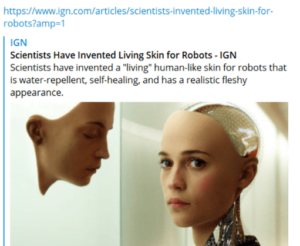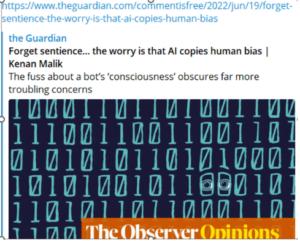We have seen how Elon Musk’s Neuralink and other companies are now trying to microchip the human brain.
They are spending billions to chip our brains in the ongoing push to microchip humanity and the “right” to cognitive liberty and in their quests to build AI that fully mimics human thought and emotive abilities.


The brain is the only place left that they haven’t hacked while keeping in mind that this magnificent organ is the most complicated machine on the planet. They haven’t even figured out how basic things that are age-old on this planet function including how the brain works and yet they act like they do as if they know what they are doing.
Do they want to change people’s personality? Are they trying to hack and decode the brain in their quest to make dystopic fiction come true and in their quest to build a type of AI that fully mimics human thought and emotive abilities?
It will be amazing when we will all be plugged up with our brains right into our computers. What could possibly go wrong?
And since they know that they cannot push it on the people by force because no one will accept they use much more of the same dystopian propaganda framing such filth as something helpful and trendy: “such technology will become ‘democratised like smartphones’.” But they never talk about the potential downsides. Yet they have been preparing the nations towards this in these recent years.
The Conversationhad brought up the need for more advanced biometrics that are hard or impossible to forge for which the solution is the brain:
“Emerging biometric technology based on the electrical activity of the brain have indeed shown potential to be fraud resistant. Over the years a number of research studies have found that “brainprints” (readings of how the brain reacts to certain words or tasks) are unique to individuals as each person’s brain is wired to think differently. In fact the brain can be used to identify someone from a pool of 102 users with more than 98% accuracy at the moment which is very close to that of fingerprints (99.8% accuracy).”[1]
“Brainprints can also be used to generate passwords that can replace conventional alphanumeric passwords or PINs in ATM machines to withdraw cash. For example rather than keying in the PIN one would connect earphones and be shown a series of PIN numbers on the ATM screen. Brain patterns would change when the correct PIN number showed up – activating the transaction. By doing so one does not have to worry about others looking over the shoulder to steal the PIN. Moreover under coerced situations brainprints will not work due to the stress – making them even more fraud resistant.”
“Given that it is difficult to copy another person’s exact thought process the technology is certainly advantageous. Considering the advancement in the technology we will likely see uptake of biometric applications based on brainprints soon – especially as part of multi-factor system for enhanced authentication. So don’t be surprised to see EEG earphones appearing in your post from the bank shortly.”
Bryan Johnson the leading technology entrepreneur had also invested $100 million in Kernel to unlock the power of the human brain by inserting chips in the brain with the sole purpose being that of “building hardware and software to augment human intelligence.” He said he wants to come up with a device to reduce “cognitive deficiencies for sufferers of conditions like Alzheimer’s and dementia.” This excuse is au par with that given by Musk – their filth is always framed as something “helpful”. Johnson wants to come up with a device that might not need to be implanted beneath the skull but which is “designed to facilitate communication between brain cells by hacking the ‘neural code’ that enables our brain to store and recall key information.”
“The former door-to-door salesman who founded payment company Braintree and sold it to eBay in 2013 for $800 million has now invested $100 million of his own cash in Kernel an LA based start-up making microchips inserted in brains to read and write neural code. The plan is to use them to fight disease first before progressing to unlocking human superpowers.”[2]
[1]https://theconversation.com/your-brain-is-unique-heres-how-it-could-be-used-as-the-ultimate-security-password-74311
[2]https://www.news.com.au/technology/science/human-body/human-brains-and-bodies-could-be-hacked-to-create-life-in-hos

